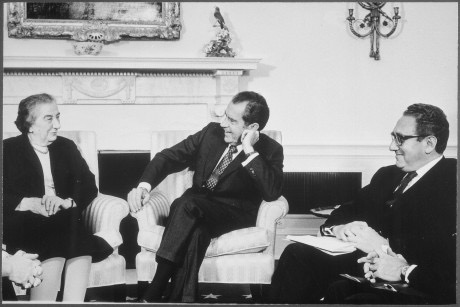(18 January 1974)
http://www.archives.gov.il/NR/rdonlyres/F85EB254-A55F-4953-BD3D-320516D10231/0/Hafrada3.pdf

Following the October 1973 War, Egypt and Israel negotiated a separation of forces agreement, known as Sinai I. Though signed after the two day Geneva Middle East Peace conference in December 1973, much of the agreement’s detail was negotiated previously between Egyptian and Israeli generals immediately after the war. American Secretary of State Henry Kissinger and Egyptian President Sadat wanted a public conference from which would flow an Israeli-Egyptian agreement. Kissinger wanted to demonstrate American dominance in Arab-Israeli negotiations, leaving the Soviet Union on the side-lines; Sadat wanted a public conference to show to the Arab world that he was not undertaking a unilateral Arab policy of negotiating separate Egyptian interests with the Israelis. Syria stayed away from the conference because it believed it to be nothing more than a show for Egypt’s interests; Jordan naively attended the conference, hoping that an Israeli- Jordanian disengagement agreement would be negotiated for the West Bank. The Geneva conference provided the fig-leaf that Sadat required. Military and political committee talks followed the conference, but they too were only symbolic diplomatic fronts. The serious negotiations were carried out by Kissinger in conjunction with Sadat and Israel Prime Minister Golda Meir. The Egyptian-Israeli disengagement agreement was signed on January 18, 1974. It included limited force zones for the Egyptian and Israeli armies and a U.N. buffer zone. The ten point Memorandum of Understanding that accompanied the disengagement agreement was meant to assure Israel of American monitoring of the agreement. For Arab-Israeli negotiations, this MOU set a valued precedent; it enshrined Washington as the key intermediary to the exclusion of Europe, the UN and the USSR, and made Washington the ‘umpire’ in assuring implementation of the disengagement agreement’s provisions. Importantly, it committed Washington to unfold future diplomatic exchanges between Israel and Egypt that eventually see the implementation of Israeli passage through international waterways, namely the Suez Canal. When the second Egyptian-Israeli Disengagement Agreement was signed in September 1975, the US again provided Israel with assurances via a memorandum of understanding, reaffirming America’s policing role in implementing that agreement, and then it included the stationing of American troops in civilian uniforms as monitors between the two armies.
-Ken Stein, December 2014.
The United States informs Israel that Egypt’s intentions are to clear and open the Suez Canal for normal operations, and to rehabilitate the cities and towns along the Canal and resume normal peacetime economic activities in that area, beginning as quickly as possible after the Disengagement Agreement is implemented.
The United States has received assurances from Egypt of its intention, upon completion of the implementation of the Agreement, to start reducing significantly its forces under mobilization if Israel gives a like indication to Egypt through the United States.
It is the policy of the United States that implementation of the Disengagement Agreement and substantial steps by Egypt to implement its intentions in Paragraph 1 above should take precedence over the undertaking of new commitments by the parties related to subsequent phases of the Geneva Conference. The United States will do its best to help facilitate the Conference proceeding at a pace commensurate with this view.
The United States’ position is that withdrawal of United Nations Emergency Forces during the duration of the Disengagement Agreement requires the consent of both sides. Should the matter of the withdrawal come before the United Nations Security Council without the consent of Israel, the United States will vote against such withdrawal.
The United States will oppose supervision of Israeli-held areas by United Nations Observers from the Soviet Union, from other Communist countries, or from other countries which have no diplomatic relations with Israel. With respect to the deployment of forces in the United Nations Emergency Forces zone, the United States will approach the United Nations Secretary-General with a view to working out arrangements whereby no units or personnel of nations which do not have diplomatic relations with Israel will [a] be deployed adjacent to the Israeli line, or [b] participate in the inspection of the Israeli area of limited forces and armaments.
The United States has informed the Governments of Israel and Egypt that it will perform aerial reconnaissance missions over the areas covered by the Disengagement Agreement at a frequency of about one mission every ten days or two weeks, and will make photographs available to both Israel and Egypt.
The United States regards the Straits of Bab el-Mandeb as an international waterway and will support and join with others to secure general recognition of the right of free and innocent passage through those Straits. The United States will strongly support free passage of Israeli ships and cargoes through the Straits. In the event of interference with such passage, the United States will consult with Israel on how best to assure the maintenance and exercise of such rights.
With regard to the Egyptian undertaking not to interfere with the free passage of Israeli ships or cargoes through the Straits of Bab el-Mandeb, the United States informs the Government of Israel that it is the United States’ position that no notification in advance of the names of vessels passing through the Straits or any other prior communication to Egypt is required. The United States will immediately seek confirmation that this is also the Egyptian position.
Recognizing the defense responsibilities of the Government of Israel following redeployment of its forces under the Disengagement Agreement, the United States will make every effort to be fully responsive on a continuing and long-term basis to Israel’s military equipment requirements.
In case of an Egyptian violation of any of the provisions of the Agreement or any of its attachments, the United States government and the Government of Israel will consult regarding the necessary reaction.
